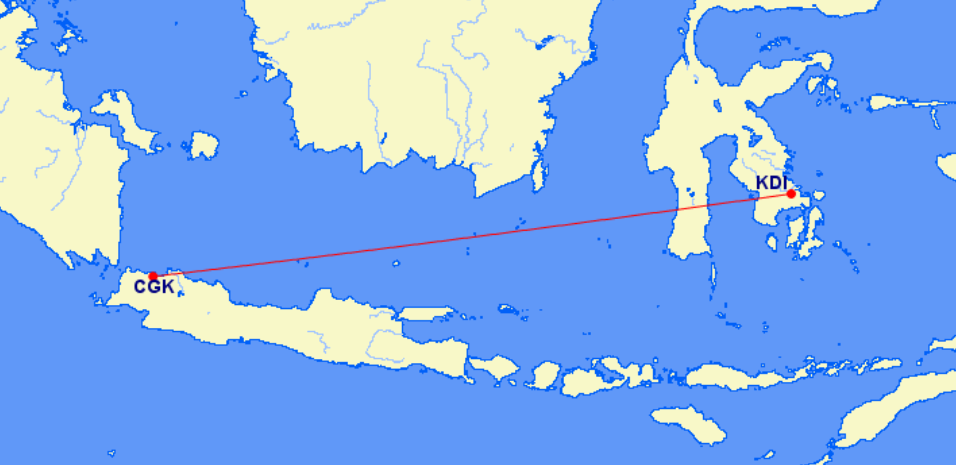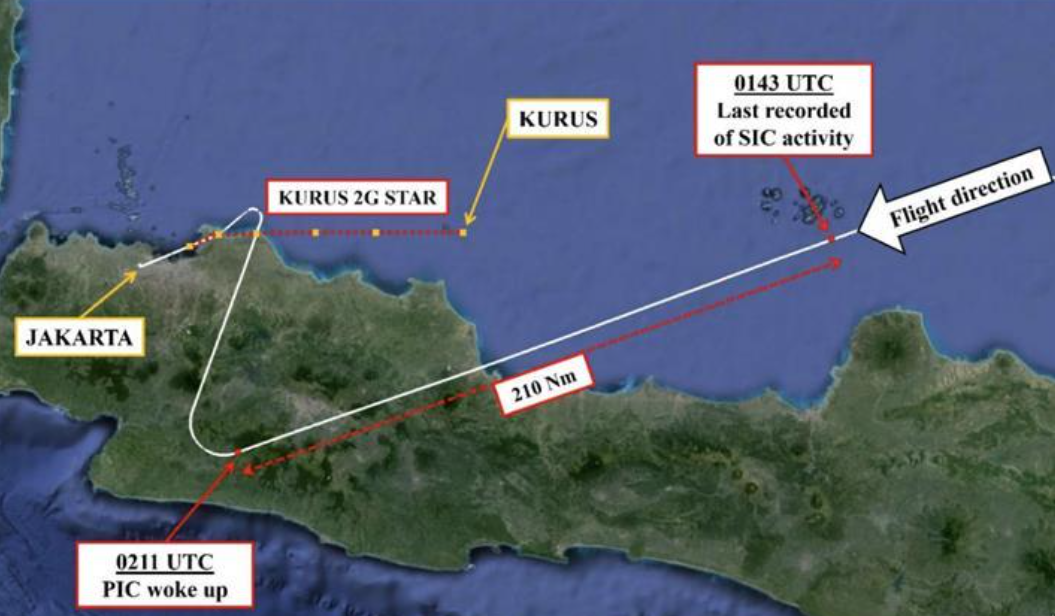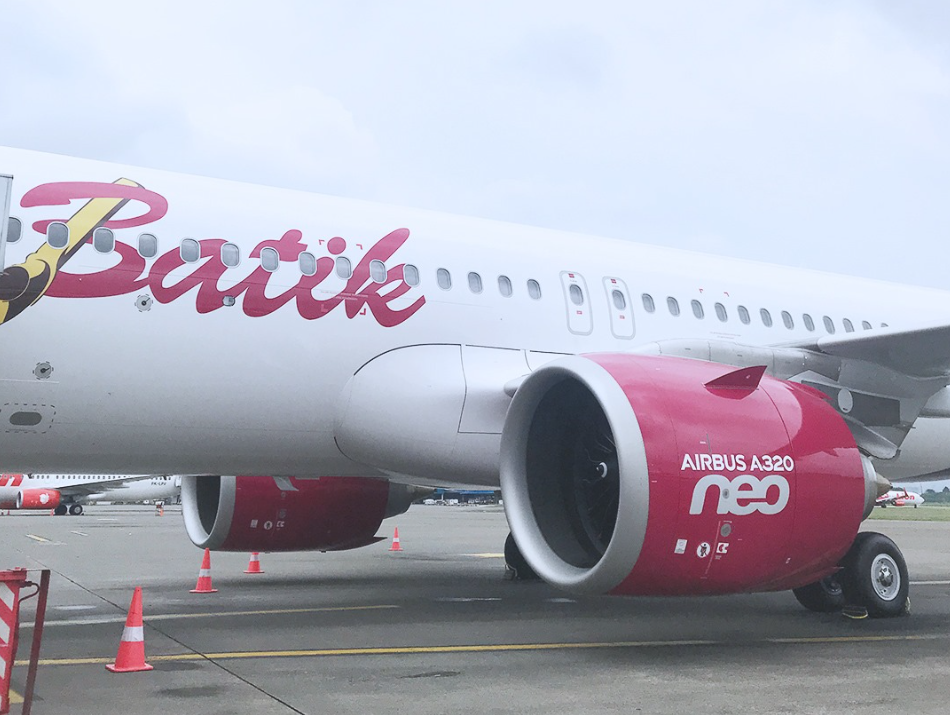Both pilots of a Batik Air Airbus A320 fell asleep in the cockpit on a flight from Kendari to Jakarta, Indonesia.
The aircraft was carrying 153 passengers, 4 flight attendants and 2 pilots. While cruising at 36,000 feet, the pilots removed their headsets and increased the cockpit speaker volume. The captain decided to take a short break and rested. After waking up, he offered to switch with the first officer but that pilot declined. The captain went back to sleep on the 1,095 mile flight.

But – while navigating around adverse weather conditions, and in the midst of communicating with both the cabin crew and air traffic control – the first officer fell asleep too.
About 28 minutes following the last communication made by the first officer, the captain woke up and noticed the first officer sleeping and woke him. The pair informed air traffic control about ‘radio issues’, rectified their off-course trajectory, and arrived safely in Jakarta.

Before departure, the co-pilot had reported inadequate rest to the captain, who took the role of pilot flying. Their earlier flight to Kendari faced weather challenges, resulting in a holding pattern before safely landing. The captain had a total of 6,304 hours of flying time, and the co-pilot had 1,664 hours of flight time.
Batik Air sent a memo to crew emphasizing the importance of communication during flight operations, reminding crew to conduct cabin and cockpit checks and to manage adequate rest periods before flight duty, particularly for early morning flights. They also sent a memo to pilots focusing on ensuring personal fitness before flight duty and ensuring sufficient, adequate, and quality rest, especially before red-eye/midnight flights, and to understand the effects of circadian rhythms.
Indonesia’s National Transportation Safety Committee (Komite Nasional Keselamatan Transportasi) has recommended:
- that the airline develop detailed guidance and procedures for the pilot personal checklist to enable them to accurately assess their physical and mental conditions before flight duties
- to formulate detailed procedures for conducting cockpit checks, which are to be performed every 30 minutes. Currently there are no specific instructions on who is responsible and how these checks should be conducted, which has led to the current policy not being implemented effectively at the carrier.

Batik Air, originally called Space Jet, was founded as a full service subsidiary of Indonesian airline Lion Air, the carrier which experienced the first of two Boeing 737 MAX 8 crashes on October 29, 2018. Meanwhile, Batik Air Malaysia is the rebranded Malindo Air.
Pilots falling asleep in the cockpit is not unique to Indonesian airlines. A decade ago, the British Airways pilot union reported on a survey of its members in which 56% admitted to having fallen asleep in the cockpit, and 29% had woken up at one point to find the other pilot asleep. 84% reported that their abilities had been compromised by fatigue in the prior six months.
Pilot fatigue is a real issue. Time zone changes are significant, and so are duty hours and rest between shifts. The U.S. law that established the 1,500 minimum hour rule for co-pilots (barrier to entry into the profession meant to limit supply and raise pilot wages) also contained pilot rest rules that meaningfully contribute to safety.


Your story has inaccuracies, again, @gary.
1) veering off course is an intentional act. You’d have to SELECT heading and twist to intentionally “VEER” off course in an airbus.it doesn’t just ‘go off course’. Yea, they deviated for weather, not veer off course. get your terminology right.
2) your implication that the pilots went as we airbus pilots call, “topless”, is somehow wrong. It’s perfectly permissable to do so, and the airplane is designed to accomodate it. Also, do you have evidence that proves they did that? Or are you just assuming avherald which isn’t accurate at all. My emergency I had- which you also reported on horribly innacurately mind you- is on avherald and to this day the author will not correct the record he so claims is true. It’s laughable.
Let the professionals detail the events and stick to your credit cards or something.
@steve – i did not write that the pilots somehow went off course by simply being asleep, they may have been groggy or otherwise lost situational awareness. i did not opine on that, try reading more carefully next time.
And i am not simply citing avherald, regardless of what personal beef you have there, i read and summarized the report from the regulatory authority.
if you would avoid the ad hominems, then you’d merely be wrong.
Guess I should be thrilled Batik screwed me over (costing me hundreds) on an upcoming flight flight in Indonesia.
I want fly them anymore because of that. Switched to Garuda
“Before departure, the co-pilot had reported inadequate rest to the captain” Should he have been replaced by another pilot? I assume he did not meet some minimum standard for rest? Sounds a bit disturbing.
There’s a reason why Indonesian air carriers generally are considered more risky to fly than US or European and (some) Asian carriers. I would not fly anything other than Garuda because they at least try for competency. I’d never fly Lion or any of its subsidiaries or Citlink unless it was the only option available and even then I’d probably entertain the idea of finding a different destination.
Many decades ago, before GPS, a trans-Atlantic plane might occasionally arrive on the other side more than a degree latitude off. The assumption was that the whole cockpit was asleep.
Another Indonesian airline having trouble properly flying airplanes, this one an Airbus. Time to consider not flying any airline from that country.